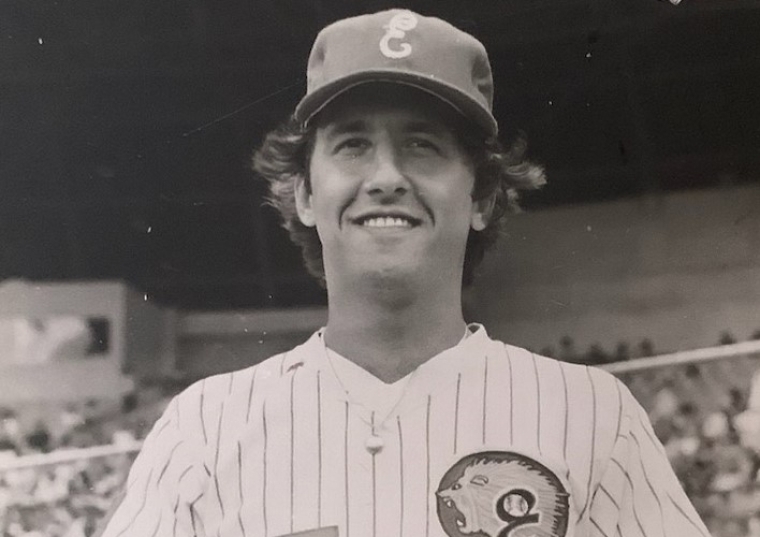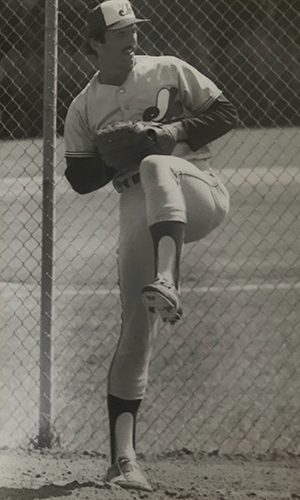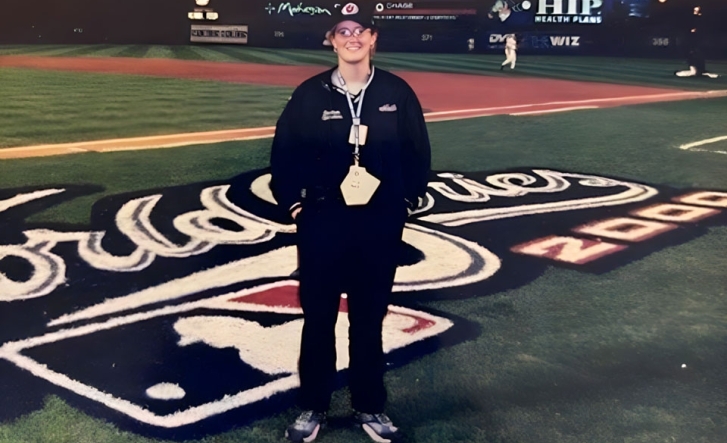No Regrets for Alumnus and Standout St. John’s and MLB Pitcher
Steve Ratzer ’75SVC initially went undrafted by Major League Baseball after an exceptional career as a pitcher for St. John’s University’s Baseball team, but he persisted in his goal to make the majors—which he did.

“They guided me from being a high school punk, through the hard stuff you learn in college, to a man. I am eternally grateful for the opportunity I was given at St. John’s; I couldn’t have made a better choice.”
“That’s all I wanted,” he said. “I never considered doing anything else.”
A native of Paterson, NJ, who later moved to Flushing, NY, Mr. Ratzer’s family loved baseball and pledged their allegiance to the New York Yankees. “My dad and I attended Yankee games probably once a month,” he recalled. “Growing up in the shadow of Shea Stadium (where the New York Mets played), we used to sneak in through a hole in the fence and enter through the outfield. We saw a lot of Mets games.”
Mr. Ratzer’s father played baseball in high school and received an offer to play for the Brooklyn Dodgers. At the time, he was taking care of his mother (Mr. Ratzer’s grandmother), so he passed on a professional baseball career, deferring that dream to his son.
“He lived that dream vicariously through me,” Mr. Ratzer explained. “My baseball training was having a catch with my dad.” Today, when Mr. Ratzer sees his adult son, the first thing they do is have a catch.
At the age of eight, while playing center field during a Little League game, Mr. Ratzer caught a ball and threw a rocket back to the catcher. “It might’ve been 120 feet, and they said, ‘This kid’s a pitcher.’”
After an exceptional career at John Bowne High School in Flushing, Mr. Ratzer initially received no college offers, but a fortuitous moment occurred when he played in the high school championship game at Yankee Stadium. “That was the same day that the All-City Team was being recognized there. I pitched in the morning and then attended the luncheon afterward for the All-City Team.” There, Mr. Ratzer met legendary St. John’s Baseball Coach and Head Athletic Director John “Jack” Kaiser ’49C.
Coach Kaiser saw that Mr. Ratzer’s glove was worn and handed him a new one. “I had a glove that was probably eight years old, and he said, ‘We would love you to attend St. John’s University.’”
While Mr. Ratzer had a few offers to play for small schools, his mother was suffering from cancer and he wanted to remain close to her. “I decided to go to St. John’s,” he said. “I had a lot of respect for Jack. He was my mentor throughout college, a second guide after my father. I was so impressed by that man.”
Beyond Coach Kaiser, Mr. Ratzer also became close with Pitching Coach Howie Gershberg. “They guided me from being a high school punk, through the hard stuff you learn in college, to a man. I am eternally grateful for the opportunity I was given at St. John’s; I couldn’t have made a better choice.”
Mr. Ratzer, who is Jewish, became close with Team Chaplain Rev. Robert J. Rivard, C.M., who also served as Moderator of Athletics from 1980 to 1993. “Having a relationship with a Catholic priest was inconceivable to me, but we just started talking about life and God. It was never a Jewish-Catholic conversation, but a God conversation.”
Coach Kaiser selected Mr. Ratzer to pitch the team’s first game of the season against the Police Benevolent Association, which was populated by former minor league players. “Nobody wanted to pitch that game, but Coach wanted to see what I could do. I pitched a no-hitter, and from then on, I was a starter for the team.”
Another of Mr. Razter’s treasured memories is pitching against Adelphi University, and future Houston Astros and Boston Red Sox hurler Joe Sambito. Both men only gave up one run for nine innings, with the win eventually going to Mr. Ratzer after St. John’s scored one more time. “I remember that so vividly because of the fierce competition and the way we battled each other.”
“I take tremendous pride in reaching the Major League level—a guy who was 5’11’ and 180 pounds, especially undrafted,” he said. “I won all those games for St. John’s and never got drafted because I didn’t throw hard enough.”
However, he received calls from three different teams: the Yankees, the Detroit Tigers, and the Montreal Expos (now the Washington Nationals). Only the Expos gave him hope of making the majors if he worked hard enough.
Mr. Ratzer signed his first professional contract at the airport in New York, which was witnessed by his father, and immediately flew to Alberta, Canada, for his first assignment. Upon landing, the team notified him that his father had suffered a heart attack almost as soon as he left. He immediately flew back to New York, and learned his father had passed away.
“The minors were tough, especially being undrafted, because teams had no financial investment in you. You have to perform every single day. You have one or two bad outings and they send you home. There was no money either. If we could find a Dairy Queen that had burgers for a dollar or 50 cents, that’s where we ate.”
Mr. Ratzer won Minor League Pitcher of the Year in 1980 and was called up by the Expos. “They had no choice but to call me up, but (manager) Dick Williams never liked me because I didn’t throw hard enough. So, I watched baseball for a month, and the last game of the season after we lost the pennant, I started.”
After not pitching for 30 days, Mr. Ratzer admits it was not an auspicious debut. The first batter he faced was Pete Rose, who drove his best pitch up the middle. “After he got to first base, he winked at me,” he recalled.
In 1981, Mr. Ratzer pitched well in Spring Training and made the team, pitching in 12 games. His one win in the big league came against the defending World Champion Philadelphia Phillies.
Mr. Ratzer noted his frustration at never pitching an inning while his team was ahead. “My specialty was preserving leads.”
The infamous 1981 Major League Baseball strike affected the course of Mr. Ratzer’s career. A week before the strike, the Expos traded for star reliever Jeff Reardon, who took Mr. Ratzer’s roster spot. “If it had been a week later, I would’ve been on strike with everyone else, but now I was back in the minors.”
After a season in Triple A in which Mr. Ratzer pitched well, the Expos traded him to the Mets. “I got every opportunity and manager George Bamberger took me aside and told me I was a great minor league pitcher, but he wasn’t sure if I was a major league pitcher.”
After another solid season in Triple A, Mr. Ratzer started pondering his postbaseball future, but still wanted a shot in the big leagues. “I refused to report to Spring Training because I didn’t think the Mets were giving me an opportunity.”
Mr. Ratzer requested a trade to the Chicago White Sox, so he could play near where he was living, and then-manager Tony LaRussa wanted him.
Mr. Ratzer had the best spring of his career and made the team for the 1983 season. “I make the club, and we fly to Arlington to start the season.”
The White Sox traded another pitcher, who had a guaranteed contract, to make room for Mr. Ratzer. The pitcher failed his physical for the new team and was sent back to the White Sox. “I was in uniform getting ready for opening day, but was told they no longer had a spot for me.”
After another great minor league season in which his team won the championship, Mr. Ratzer realized he was missing his young daughter’s childhood, and decided to retire. He played amateur baseball in Florida for a time.
At the same time, he began coaching travel and high school baseball—and has remained connected to the game ever since. Mr. Ratzer was the pitching coach at Hilton Head Island High School in Hilton Head, SC, last season, and does individual coaching for young baseball hopefuls.
“I ask my kids, ‘Do you want to be someone who plays baseball, or do you want to be a baseball player?’ If you want to be a baseball player, it has to be your life. If you want to play and be mediocre, I am not the person to be around. That comes from Coach Kaiser. If you’re going to do something, do it to the best of your ability and accept the result.”
“Baseball has created my entire world—not so much the game itself, but the relationships. It’s all good. I have no regrets. What a great journey I have had in this life.”





